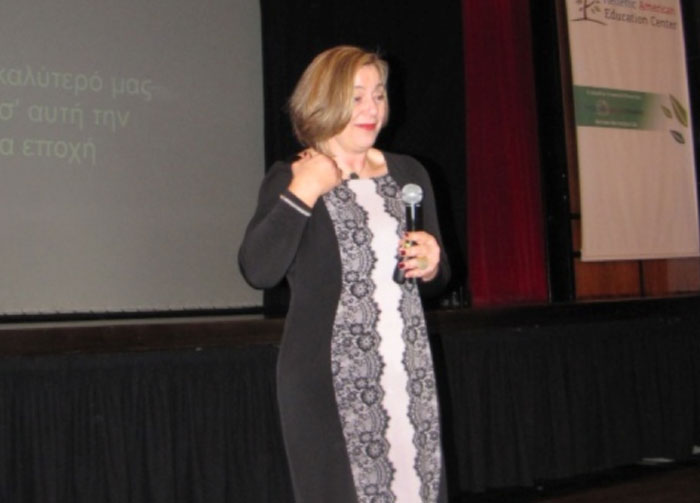QLS (Quality Language Services) opened the activities for 2013 with a series of seminars for the parents of their students in towns where there is a QLS member school. This ‘road-show’ aimed at informing interested parents on issues such as the role of the parents, children-parents relationships, how children acquire learning skills and abilities etc.
The Athens seminar was held on 10th last March at the hospitable premises of the Hellenic American Union. Mrs Ioanna Skarlingou (Byron Language School- Patissia) welcomed parents while Mrs Georgia Pappas (European Languages Centre- Alimos) introduced the speakers.
Yiannis Petropoulos (Hellenic American Union) discussed therole of parents. Parenthood can be difficult at best and parents don’t have an instruction book given to them to raise their children so mistakes will be made. There are always those magic words, “I was wrong, and I’m sorry.” As long as parents try their very best to bring their children up then they have done themselves proud and have brought up strong and confident children.
Parents will always be a child’s first and most instinctive role model. They will start looking to them for guidance from the time they are a baby. But as they grow older, they may shift and look to others.
Yet they should always be able to see their parents as good role models. For this, it’s important that parents remember that their children will emulate them, repeating behaviours, words and actions.
So parents should be especially mindful to present the best example possible.

Changing How They Process Information
This new generation of “Digital Natives” has had such a different range of experiences during key developmental phases, that they actually think and process information differently. They develop hypertext minds. They leap around. It’s as though their cognitive structures are parallel, not sequential. Because they have become accustomed to receiving information very quickly, they are adept at parallel processing and multi-tasking. They function best when networked. They thrive on instant gratification and frequent rewards. This means that lectures and the typical step-by-step instructions common in our current teaching methodologies do not work to engage them. In fact, the linear thought processes that dominate educational systems now can actually retard learning for brains developed though game and web surfing processes on the computer.
Changing the Role of the Teacher
Growing up in the digital era means easy access to all forms of information at breakneck speed. Our educational system has been unable to keep pace with the possibilities and implications for children navigating the learning process within this new landscape. The unlimited access to information which can now be viewed and digested at a student’s own rate of learning and in accordance with a student’s own level of interest, significantly changes the dynamics of the learning environment. While the teacher generally teaches in a specific, grade-related order, presenting predetermined information in installments, students are now functioning in an ungraded, unlimited and interactive environment. Students have the power to decide for themselves what is easy, what is appropriate, what they want to learn and how long they will take to learn it.
The unquestionable authority that adults once had over children is disappearing. Our system, however, still places the teacher as expert in front of a classroom, doling out information that may not be as up to date as what the student is able to find on their own. Youth (especially at the adolescent level) are forced to “learn” within a rigid system that does not match with the world in which they function or the interest and interaction that they encounter outside the walls of the classroom. It creates a recipe for disengagement.
The Need for New Skills
Compounding the issues of how we are teaching is the issue of what we are (or are not) teaching to help youth deal effectively with the new realities of the digital era. The ways that these students have learned to process information may well lead to deficits in other skill areas that are imperative for deep understanding of concepts, problem solving and creative thinking. Raised in an environment of instant response and immediate feedback, we need to help youth develop concentration skills, the patience to persevere and the ability to postpone gratification in order to complete larger tasks. In addition, the sheer amount of information now available means that new skills are needed to be able to sift through what is available and differentiate valid sources. Youth also need to be able to organize smaller bits of information within a larger picture, to synthesize and draw conclusions. They need to be able to place isolated facts in a context that gives it significance in order to turn information into knowledge. What really is more important in education than preparing our children to function and thrive in the world in which they live? We cannot continue to assume that what worked for students raised before the digital era will work for students today.

In brief, ‘learning to learn’ offers pupils an awareness of:
- how they prefer to learn and their learning strengths
- how they can motivate themselves and have the self-confidence to succeed
- some of the specific strategies they can use, for example to improve their memory or make sense of complex information
- some of the habits they should develop, such as reflecting on their learning so as to improve next time.
The key-point in ‘learning to learn’ is simply that the most efficient way to learn something that you will actually put into action is to decide what must be learned and how to learn it yourself, rather than taking a complete prescription from someone else. Someone else may be able to break down subject matter and assist in your learning, but you ultimately are responsible for your own education.
Natasha closed her presentation by referring to John Medina’s brain rules:
· Every brain is wired differently
· Exercise improves cognition
· We are designed to never stop learning and exploring
· Memories are volatile
· Sleep is powerfully linked with the ability to learn
· Vision trumps all of the other senses
· Stress changes the way we learn
Conclusion
All speakers agreed that there were/are/will be times when the parents don’t model the best example for their children. But the important thing is that they learn from their mistakes and resolve to make changes that will influence the children for the better.
Anastasia Spyropoulou
